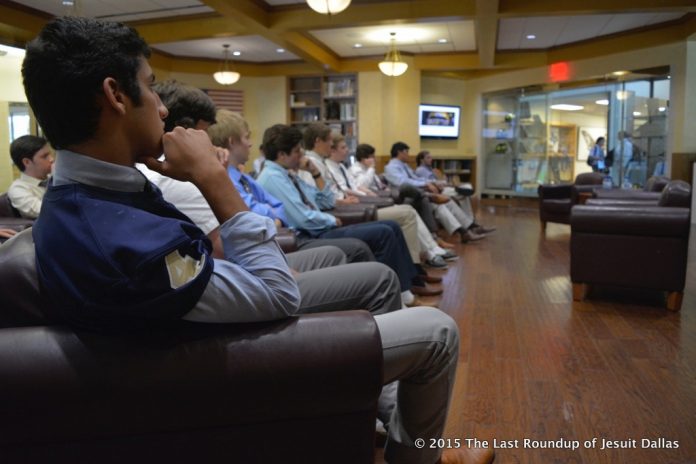The first Ignatian Days at Jesuit College Preparatory took place on October 5th, 2016 and November 9th, 2016, organized by Dr. McFarland, Mrs. Ochs, and Mr. Williams, alongside the help of other faculty and staff, including retired administrator and history teacher Mr. Fred Donahue. Ignatian Days have helped Jesuit students by guiding them to make the right decisions and to employ these decisions in their lives.
As well as inside the classroom, teachers encouraged students to incorporate time with their families for about thirty to forty-five minutes on the first Ignatian Day: Academic Integrity. With this Ignatian Day, students were encouraged to review the consequences of academic dishonesty, and were even surveyed on their own opinions over given hypothetical propositions of academic dishonesty, ranking behaviors from “no cheating” to “serious cheating.”
Most students were found to understand the rules and circumstances of academic honesty. Since the first Ignatian Day gave an introduction to the concept of Ignatian Days, students felt more comfortable with the second Ignatian Day, taking place one day after Election Day in the U.S..
According to Mrs. Ochs, Chair of the Social Studies department at Jesuit, the Social Studies department, “every four years, hosts an Issues Day associated with the election.”
Furthermore, she explained that, “Actually, we have two prayer services before [Issues Day] that prepare students about Catholic studies and voting.” Because most students at Jesuit can’t vote, the Issues Day would represent “what it means to be an Ignatian citizen,” she added. Prior to the Issues Day, the two Prayer Services were organized in order to “tie all that together,” Mrs. Ochs clarified.
Mr. Donahue took charge of the putting together the historical readings for parents and students, as well as participating in the Issues Day the Monday before, to link to the Ignatian Day. He wanted parents and students to reflect on the question, “what would you do as a good Ignatian citizen?” concerning the polarizing issues in the election.
Mrs. Ochs described the Ignatian Day as an event that “was going to be something that was on people’s minds, regardless of whether they were a Democrat or Republican.”
Additionally, Mrs. Ochs elaborated, “we thought that it was really important to make that particular issues today about the election and ultimately… we cared about you being an Ignatian citizen.” With this, she hoped people would see the benefit of the I-Day, engaging and being educated, as more than simply being something that takes people apart based on their political beliefs.
As a conclusion statement, she wanted people to recognize that “one of the goals of the I-Day—doesn’t matter what I-Day you’re talking about—is to build opportunities for students and their parents to communicate.”
Discernment and reflection are huge parts of Ignatian philosophy. The I-Day was a great example that not only we, as Jesuit-educated students, but all groups of people are called to discern before making big decisions.






